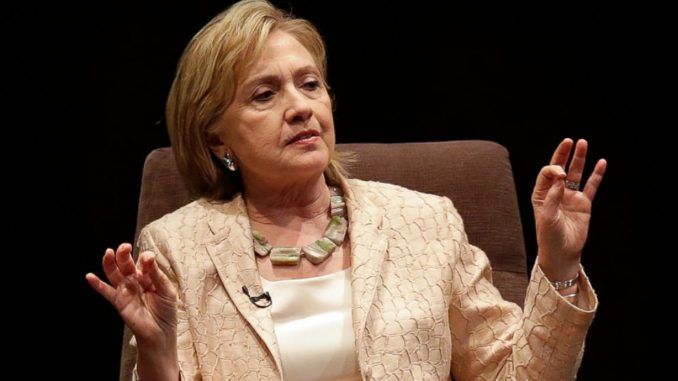
Hillary Clinton was warned twice about using Blackberry devices and personal email for government business by the State Department’s top security official, yet she refused to heed the warnings.
The information comes courtesy of a lawsuit launched by Judicial Watch, the team of American lawyers hellbent at getting at the truth surrounding the notorious Clinton email scandal.
“Thanks to our court-ordered discovery, we now have confirmation that Hillary Clinton was warned by the top security official in the State Department that unsecure Blackberry and email use was a security risk, yet Hillary Clinton ignored these warnings,” said Judicial Watch President Tom Fitton.

BYPASS THE CENSORS
Sign up to get unfiltered news delivered straight to your inbox.
You can unsubscribe any time. By subscribing you agree to our Terms of Use
On one occasion, Hillary Clinton even told Eric Boswell, the former head of diplomatic security, that she “gets it” — but she did not stop using her unsecured Blackberry devices and her home-brew email server.
Boswell, who was in charge of protecting the security of State Department staff, said he was “surprised” to learn that Hillary Clinton used a personal email address to conduct government business and he testified in a deposition this month that he even warned Clinton and other State Department staff against the use of personal emails.
“We also urge Department users to minimize the use of personal web email for business, as some compromised home systems have been reconfigured by these actors to automatically forward copies of all composed emails to an undisclosed recipient,” read a 2011 memo that bore his signature.
WashingtonExaminer reports: Clinton was a recipient of the memo, but Boswell could not confirm whether the secretary of state actually read it.
Boswell, who stepped down from his position in 2012, said he and other former State Department officials had spoken about Clinton’s use of the private email address clintonemail.com as a “general issue.“
“We were surprised,” he added.
Boswell participated in a deposition this month as part of a court-ordered discovery related to Clinton’s use of an unauthorized email server during her time as secretary of state. A federal judge ruled that several Obama administration officials would have to answer conservative watchdog group Judicial Watch’s questions about whether Clinton intentionally attempted to evade the Freedom of Information Act by using a nongovernment email system.
Boswell also warned Clinton against her use of Blackberry devices in the executive offices of the State Department. In a previously declassified memo to Cheryl Mills, Clinton’s chief of staff, Boswell said the secretary of state should discontinue her use of the device due to “vulnerabilities and risks.”
Although Clinton assured Boswell she read the internal memo and “gets it,” an email obtained by Judicial Watch indicates she still carried the device “[a]gainst the advice of the security hawks.”
The debate over whether Clinton’s home-based email server, which she claims was set up for convenience, remains alive today. During a hearing with Attorney General William Barr this month, Rep. Louie Gohmert accused FBI Director Christopher Wray of a pro-Clinton cover-up by not pressing the intelligence community for proof that it was not hacked by China.
Also this month, partially redacted documents were released by the FBI that were part of the bureau’s “Midyear Exam” investigation, which looked into Clinton’s mishandling of classified information on her unauthorized private email servers while serving as secretary of state. The documents put on display a sense of alarm among Clinton’s staff following what they feared to be a hack of the server and glaring security oversights.
The FBI investigation into Clinton’s emails came to a conclusion during the 2016 presidential election. Former FBI Director James Comey publicly recommended in 2016 that no charges be brought against Clinton, who was then a candidate for president, but admonished Clinton and her colleagues for being “extremely careless” in handling classified information.
One of the main controversies stemming from Clinton’s emails was how a technician managing the server deleted 33,000 emails. The FBI was only able to recover about 5,000 of the emails, which were released in tranches up until earlier this year as part of a Judicial Watch lawsuit. Clinton has said she “never received nor sent any material that was marked classified,” but the FBI found 110 emails did contain classified information.
Clinton has long blamed the FBI’s handling of the investigation as a reason for her 2016 loss to President Trump.


